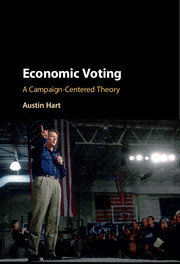
- Cited by 7
-
Cited byCrossref Citations
This Book has been cited by the following publications. This list is generated based on data provided by Crossref.
LeVan, A. Carl 2018. Contemporary Nigerian Politics.
Larsen, Martin Vinæs 2019. Is the Relationship Between Political Responsibility and Electoral Accountability Causal, Adaptive and Policy-Specific?. Political Behavior, Vol. 41, Issue. 4, p. 1071.
Berz, Jan 2020. The effect of voters’ economic perception, Brexit and campaigns on the evaluation of party leaders over time. The British Journal of Politics and International Relations, Vol. 22, Issue. 2, p. 202.
Greene, Kenneth F. 2021. Campaign Effects and the Elusive Swing Voter in Modern Machine Politics. Comparative Political Studies, Vol. 54, Issue. 1, p. 77.
Taylor, Mark Zachary 2023. The economic drivers of political time. Presidential Studies Quarterly, Vol. 53, Issue. 1, p. 29.
Stiers, Dieter 2023. How Do Voters Evaluate Performance in Opposition?. Government and Opposition, Vol. 58, Issue. 4, p. 725.
Singer, Matthew 2025. This Crisis Is Different: Weakened Economic Accountability During the COVID‐19 Pandemic. Presidential Studies Quarterly, Vol. 55, Issue. 1, p. 34.
- Publisher:
- Cambridge University Press
- Online publication date:
- September 2016
- Print publication year:
- 2016
- Online ISBN:
- 9781316556764


